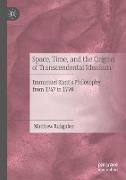- Start
- Space, Time, and the Origins of Transcendental Idealism
Space, Time, and the Origins of Transcendental Idealism
Angebote / Angebote:
This book provides an account of the unity of Immanuel Kant's early metaphysics, including the moment he invents transcendental idealism. Matthew Rukgaber argues that a division between "two worlds"-the world of matter, force, and space on the one hand, and the world of metaphysical substances with inner states and principles preserved by God on the other-is what guides Kant's thought. Until 1770 Kant consistently held a conception of space as a force-based material product of monads that are only virtually present in nature. As Rukgaber explains, transcendental idealism emerges as a constructivist metaphysics, a view in which space and time are real relations outside of the mind, but those relations are metaphysically dependent on the subject. The subject creates the simple "now" and "here, " thus introducing into the intrinsically indeterminate and infinitely divisible continua of nature a metric with transformation rules that make possible all individuation and measurement.
Folgt in ca. 5 Arbeitstagen

